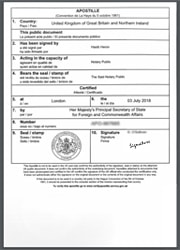
The Apostille, also known as the Apostille Convention, Apostille Treaty and its full name the Hague Convention Abolishing the Requirement of Legalisation for Foreign Public Documents, is in fact an international treaty.
THE NAME
Apostille comes from the French word apostille (meaning “marginal annotation or note”), itself from the Old French word apostiller (meaning “to make marginal notes”) which was derived from the Latin word postilla (meaning “after those”).
PURPOSE
The purpose of the Apostille is to simply the usage of documents from one jurisdiction into another. It removes the need double-attestation – namely for the document to be attested by both the country where the document was issued, and the country where the document is to be used. The treaty came about through the Hague Conference on Private International Law. As such you’re also likely to hear it referred to as a Hague Apostille.
HOW TO GET AN APOSTILLE
Each country has its own procedure for obtaining an Apostille, but we’ll be sticking to the UK procedure here. In the UK, documents are only apostilled by the Foreign and Commonwealth Office, known as the FCO for short. The FCO has two counters in the UK, one in Milton Keynes and one in London.
The FCO will only process the document if it has been issued or certified by an officer recognised by the UK government. In practical terms, this means two things: Firstly, that any document issued by an officer of a UK government department can be apostilled directly at the FCO. This includes documents such birth, death or marriage certificates, a letter/certificate from HMRC, or an original signed document from Companies House. Secondly, any document not issued by the government will need to be certified first by an officer recognised by the government. If you have a power of attorney, degree certificate or board resolution, you’ll need to take it to a notary to be certified.
THE APOSTILLE
The Apostille itself is a printed form which is affixed to the document. If the document has been certified by a notary, the form will be affixed to the back of the notarial certificate and if the document has been issued by a government official it will likely go on the back of the document itself. The form will state who signed the document (i.e. the name of the notary or government official), in what capacity they signed, and identify whose stamp/seal is affixed to the document. It will then state where it has been apostilled, the date, by whom, and a unique apostille number. Finally, the form will be sealed by the FCO and signed by the person issuing the Apostille.
EFFECT OF THE APOSTILLE
Once a document has been apostilled it will be legally valid in any country that has signed up to the Hague Convention. For a list of country’s signed by as of 17 January 2019 check out below. If your country isn’t on the list, don’t despair. If just means that after the Apostille has been obtained the document will need to be submitted to the London consulate for that country. They will then perform their own authentication on the document.
CONCLUSION
So that’s the Apostille. A term to describe authentication of your document by the Foreign and Commonwealth Office. A process carried out by the Foreign and Commonwealth Office. I hope that gives you a bit more of an insight in the world of the Apostille.

